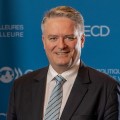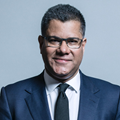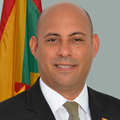Wednesday, Oct 12, 2022 | 02:30 PM - 03:15 PM
Location: HQ1 Atrium, HQ1-1-700

Multilateral institutions, including IFIs, are key contributors to the climate agenda, working together to help shape the intellectual debate on climate issues, and helping member countries develop policies to reach the goals under the Paris Agreement. As panelists, representatives from key multilateral institutions will describe how their respective institutions collaborate on climate issues with a special focus on designing and helping to finance mitigating policies.
Join the conversation via ![]() #ClimateMatters
#ClimateMatters
 |
Nadia Calviño |
Nadia Calviño currently serves as President of the International Monetary and Financial Committee (IMFC). She has been First Deputy Prime Minister of Spain and Minister for Economy and Digitalization since July 2021. Prior to that, she held several other high-level positions in the Government of Spain. From 2014 to 2018, she was the Director General in charge of the Budget within the European Commission. Previously, she held other senior management positions in the European Commission and worked in the Spanish Government. She holds a degree in Economics (1991) from the Universidad Complutense de Madrid (Spain) and a degree in Law (2001) from the Universidad Nacional de Educación a Distancia (UNED).
 |
Kristalina Georgieva |
Kristalina Georgieva is the Managing Director of the International Monetary Fund (IMF). She is the first person from an emerging market economy to lead the IMF since its inception in 1944. Before joining the Fund, Ms. Georgieva was Chief Executive Officer of the World Bank and also served as Interim President for a time. Previously, she served at the European Commission as Vice President for Budget and Human Resources – and as Commissioner for International Cooperation, Humanitarian Aid and Crisis Response. She was named “European of the Year” and “Commissioner of the Year” by European Voice for her leadership in the European Union’s humanitarian response to crises.
 |
Mathias Cormann |
Mathias Cormann currently serves as Secretary-General of the Organization for Economic Co-operation and Development (OECD). Prior to his appointment to the OECD, Mr. Cormann served as the Australian Minister for Finance, the Leader of the Government in the Australian Senate and as Federal Senator representing the State of Western Australia. Previously, he worked in several other functions in the Government of Australia. Mr. Cormann was born and raised in the German-speaking part of Belgium. He migrated to Australia in 1996. He graduated in law at the Flemish Catholic University of Louvain (Leuven), following studies at the University of Namur and, as part of the European Erasmus Student Exchange Program, at the University of East Anglia.
 |
David Malpass |
David Malpass currently serves as President of the World Bank Group. Mr. Malpass previously served as Under Secretary of the Treasury for International Affairs for the United States. Before joining the U.S. Treasury, Mr. Malpass was an international economist and founder of a macroeconomics research firm based in New York City. He served as chief economist of Bear Stearns. Previously, Mr. Malpass served as the U.S. Deputy Assistant Secretary of the Treasury for Developing Nations and Deputy Assistant Secretary of State for Latin American Economic Affairs. Mr. Malpass earned his bachelor’s degree from Colorado College and his MBA from the University of Denver. He was a CPA and undertook advanced graduate work in international economics at the School of Foreign Service at Georgetown.
 |
Alok Sharma |
Alok Sharma is the President for the 2021 COP26 conference in Glasgow. Previously, he held high-level positions in the UK Government, including Secretary of State for Business, Energy and Industrial Strategy, Secretary of State for International Development, Minister of State for Employment at the Department of Work and Pensions, Minister of State for Housing and Planning. Mr. Sharma has been a Conservative Member of the UK Parliament since 2010. Previously, he worked in the professional services industry. He graduated in Applied Physics and Electronics from the University of Salford and is qualified as a chartered accountant.
 |
Simon Stiell |
Simon Stiell is the Executive Secretary of the United Nations Framework Convention on Climate Change (UNFCCC). From March 2013 to June 2022, he served as a senior minister in the Government of Grenada, holding the portfolios of Minister for Climate Resilience and the Environment for five years. He also served as Minister for Education and Human Resource Development, Minister of State with responsibility for Human Resource Development and the Environment, and as a junior minister within the Ministry of Agriculture, Lands, Forestry, Fisheries and the Environment. Mr. Stiell served as member of Grenada’s Upper House of Parliament, the Senate, where he held the position of Leader of Government’s Business throughout this period. Prior to his return to Grenada, Mr. Stiell had a successful career, spanning 14 years within the technology sector and holding senior executive positions in a number of industry leading companies, from Silicon Valley based technology start-ups, to major corporations including Nokia and G.E.C. He originally trained as an engineer and holds a Master of Business Administration from the University of Westminster in the United Kingdom.